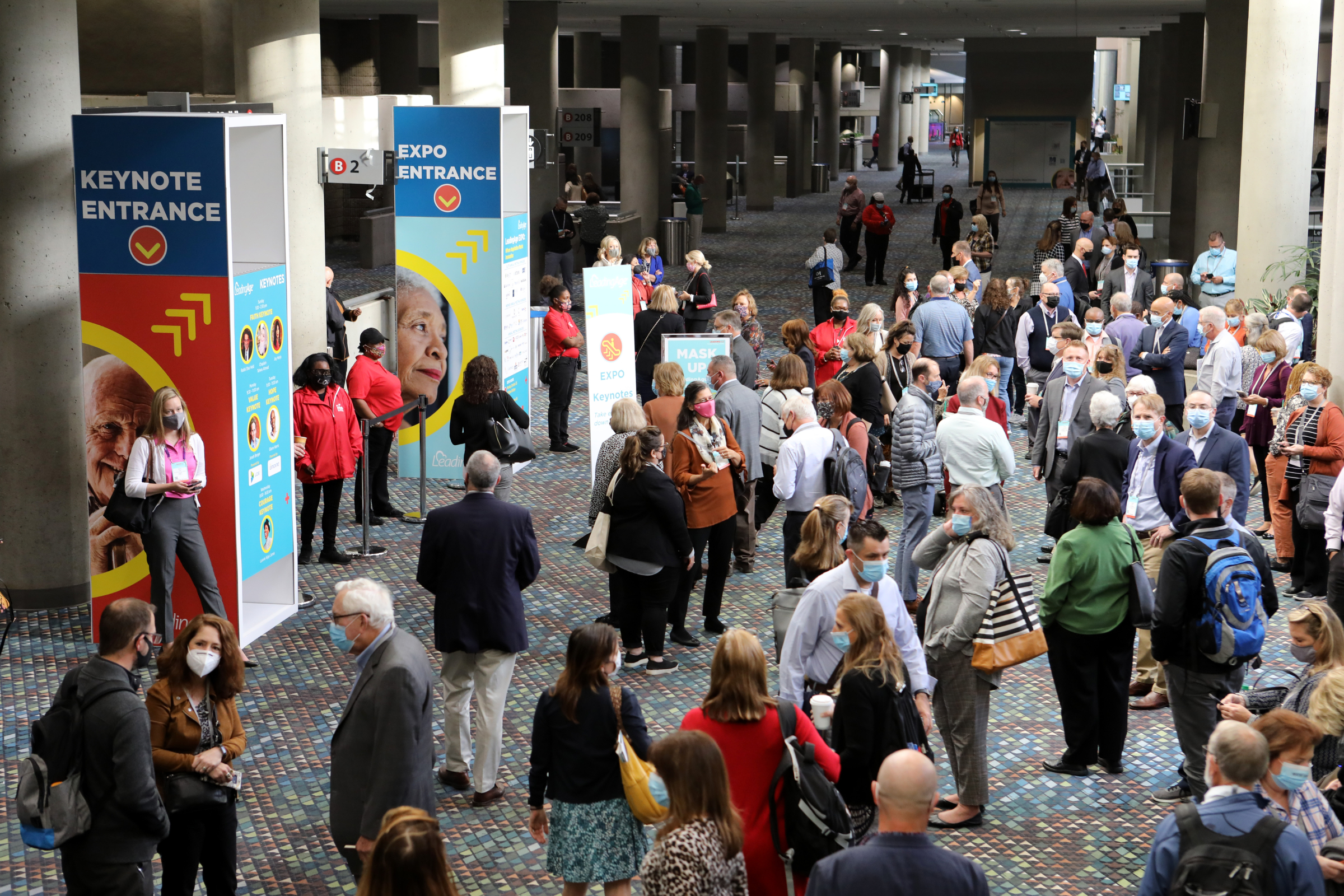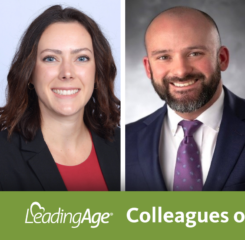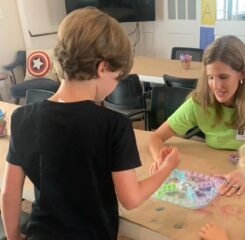Improvise, Adapt, Overcome: LeadingAge Members Stand Tall During the Coronavirus Crisis
Heroism Under Intense, Unprecedented Circumstances
In 2019, we launched the LeadingAge Catalyst program to honor organizations and individuals who demonstrate unwavering commitment to service. The monthly Catalyst recognitions highlight excellence in programming, innovation, education, or leadership.
The coronavirus crisis has brought out the heroes in all of our members. In light of the many stories we’ve gathered, how could we choose just one?
For their courage, creativity, and dedication to the people they serve and their employees—under intense, unprecedented pressure—we are recognizing all LeadingAge members, collectively, as our Catalysts for April 2020. Thank you for the incredible and inspiring work you do every day.
The U.S. Marine Corps trains its troops to “improvise, adapt, and overcome” any obstacle in difficult situations. As we battle the coronavirus health crisis, this phrase could be applied to the membership of LeadingAge as well.
Among the many heroes coming to the fore during the pandemic, our members are perhaps among the most unsung. Charged with the protection and care of vulnerable older people, and the protection and support of frontline caregivers doing hazardous but essential work, LeadingAge members face shortages of staff and crucial supplies. They are caring for residents who are COVID-19-positive, or preparing for the likely entrance of the virus into their communities.
Beyond the short-term damage done by the virus, providers also face long-term uncertainty about when—or if—their operations can ever return to something like “normal.” The future of some organizations may even be threatened.
“I have tried to come up with 100 ways to describe this, but it’s an enemy that is so cagey, and difficult to put your arms around,” says Carol Silver Elliott, CEO/president of The Jewish Home Family, based in Rockleigh, NJ, and chair of the LeadingAge board of directors.
“I think everyone who works in our [field] is a hero. Every person in an organization that is providing care, on the front lines, is someone we should recognize,” she says. “This is a challenge beyond our imaginations. In so many of these [conference] calls on the state and national level, you see that every single provider is squaring their shoulders, taking a deep breath, and doing what needs to be done.”
Improvise
LeadingAge members have had to cancel some common practices and close down many services during the crisis. Old tasks need to be done in new ways, and unexpected new tasks must be added.
When Athens Community Council on Aging (ACCA) shut down its 14 adult day programs, it changed its whole service delivery model on the fly to focus on delivery of food and basic needs, security checks, and virtual social connections for more than 830 seniors (more than 500 of whom are new clients since March 16).
When a childcare/intergenerational program run by St. Paul’s Senior Services, San Diego, CA, had to be closed, the teachers were reassigned to open a free childcare service for the organization’s employees, some of whom are in military families and have no local family for support. Another member, Homewood at Martinsburg, Martinsburg, PA, has set up a “Child Care Exchange” bulletin board to help match staff who need childcare with staff who have high-school- or college-aged kids who can help. Other members have set aside space—with separate entrances to protect residents—for childcare services.
The technology department at Presbyterian Villages of Michigan has access to a 3-D printer, and is using it to produce 150 face shields a day.
Fellowship Senior Living, Basking Ridge, NJ, has created an in-house TV studio—in space made available by a construction project—to produce live-streaming content for residents.
“You see that every single provider is squaring their shoulders, taking a deep breath, and doing what needs to be done.”
Adapt
Everyone is living under new sets of rules. Members are adapting to significant, but probably short-term, changes in regulations and guidelines. They are adjusting in nearly every area—from operations, to day-to-day practices, to how they support their staff.
The health and personal lives of frontline caregivers working at LeadingAge-member organizations are under threat from the coronavirus. This new reality has led many providers to increase pay, offer bonuses and childcare options, boost sick leave and PTO, and more.
Several members (Bethany Home Association, Lindsborg, KS; Garvey Manor, Hollidaysburg, PA; and Gurwin Jewish Family of Healthcare Services, Commack, NY) are hiring for newly created positions to ease burdens on direct caregivers. Typical tasks include meal delivery, helping with cleaning, and other non-clinical jobs.
Residents at an intergenerational housing provider, Bridge Meadows, Portland, OR, didn’t blink when they realized staff would need to work remotely: “We got this,” they said.
Members are supporting staff with bonuses, “appreciation pay,” meals, extra shifts, and more. The New Jewish Home, in New York City, NY, has set up a database, “Staffing Central,” to track employees who are able to be reassigned to different tasks. St. Ann’s Community, Rochester, NY, gave appreciation bonuses to 875 employees on March 27—$500 to full-time workers and $250 to part-timers. The Jewish Home Family, Rockleigh, NJ, has created an onsite grocery service for employees and residents and a PTO bank with donated hours from other staff. Employees are being offered extra hours, additional training to be able to work in other capacities, and more.
Presbyterian Homes & Services (PHS), Roseville, MN, in partnership with Minneapolis-based Allina Health, is preparing to use one of its Interlude™ Restorative Suites locations to provide post-acute care for patients diagnosed with COVID-19. Clinical, staffing, building, and equipment modifications have been made to care for individuals on COVID precautions, and services were scheduled to begin on April 20.
Members that have existing phone-based programs to provide reassurance or activities are boosting their services to serve more elders. Institute on Aging, San Francisco, CA, is handling more traffic on its accredited crisis phone line, while investing in technical upgrades and transferring idled employees to be operators. Covia, Walnut Creek, CA, is reconfiguring some programming on its Well Connected and Well Connected Español phone-based activity programs, adding ad hoc programming on the coronavirus and emergency preparedness. The Telephone Reassurance Program operated by Eskaton, Carmichael, CA, has dramatically increased its client numbers, and is connecting them to delivery services for groceries and pharmacies.
Seabury Resources for Aging, Washington, DC, has transformed its delivery systems to bring services directly to elders in their homes instead of taking them to services, as it normally would. Seabury’s transportation services have been reverse-engineered, says Deborah Royster, CEO: “Our drivers are taking meals directly to customers in their homes. It has been an enormous logistical process, because there are a lot of people participating, and the city has expanded [the meals program].” Seabury, accustomed to delivering meals to 350 people per week, now serves over 2,000 people; each delivery includes a full week of meals. Royster notes that the crisis has revealed much greater need for food in the city than anyone had realized before.
Sequoia Living, San Francisco, CA, is partnering with Morrison Living to deliver a free weekly box of groceries—for the duration of the shelter-in-place order—to 550 low-income seniors living in Sequoia’s affordable housing communities.
Many members helped residents and clients celebrate Passover and Easter with remote Seders and Easter services and delivered meals.
Overcome
Members are overcoming the separation of residents from their families and friends, by connecting them by any means necessary. They are overcoming fear by instituting training to handle COVID-19 cases and building camaraderie. And they are overcoming traditionally negative attitudes about long-term care, gaining positive and sympathetic press coverage by supporting residents and clients in a dangerous time.
Two LeadingAge members, National Church Residences and Ohio Living, both in Columbus, OH, along with LeadingAge Ohio, are helping to create a program to bring COVID-19 testing to at-risk elders in provider communities. The PARRT program (Post-Acute Regional Rapid Testing) launched this week in cooperation with the Ohio Department of Health and the Franklin County and Columbus health departments. It offers COVID-19 testing within 24 hours of symptoms arising, and an Ohio Department of Health lab turns around results within a day.
Presbyterian SeniorCare Network, Oakmont, PA, has created #RaysOfSunshine, an effort to encourage people to communicate with its residents during the coronavirus crisis. Well-wishers are invited to send “a note or a card, long or short, big or small, homemade or store-bought,” that can be shared with the organization’s residents, patients and employees.
RiverSpring Health, Bronx, NY, holds regular family information webinars, and has reassigned idled staff as the “Facetime team” to facilitate communication between residents and families.
Employees at Gurwin Jewish Family of Healthcare Services, Commack, NY, are using iPads to help residents do virtual visits with family, and a “GranGram” program accepts video messages from family members and shows them to residents.
The leaders and staff of United Church Homes, Marion, OH, are collectively overcoming fear of the virus by building a “warrior ethic” among staff (complete with photos, videos, and hashtags like #UCHFlex and #UCHWarriors). The organization is actively doing COVID-19 drills to build camaraderie and help staff feel prepared for COVID-19-positive residents.
Employees at all levels are becoming leaders to cope with unexpected challenges (Parker, Piscataway, NJ; and 2Life Communities, Brighton MA).
Aldersgate, Charlotte, NC, is overcoming resident isolation, despite social distancing, with a variety of clever activities to keep apartment-bound elders socialized: balcony singing of Irish songs; balcony charades; activity bulletin boards; “light up the night” time in the evening, including flashlights and Morse code sheets; and a parade of “floats” (decorated golf carts) residents can vote on.
Two Connecticut members, Cherry Brook Health Care Center, Canton, and Jerome Home, New Britain, earned positive coverage in a Hartford Courant article on how residents can stay connected to family. Two Pennsylvania members, Concordia Lutheran Ministries, Cabot, and Presbyterian SeniorCare Network, Oakmont, were profiled in a sympathetic Pittsburgh Post-Gazette article about workforce challenges for the organizations and their employees.
Kavod Senior Life, Denver, CO, was the subject of a local TV news segment about financial challenges faced by residents of affordable housing. A posting from Kavod Board Chair Rob Friedman inspired the report, which led to donations of food and other supplies for the residents. The segment included an interview with Kavod President and CEO Michael Klein, who made the case for supporting low-income elders.
Crisis Creates Community and Stories to Tell
“This [crisis] has really brought out the very best in our community ,” says Seabury’s Deborah Royster, who also serves on the LeadingAge board. “Our employees are so incredibly committed and mission-driven, seeing them rise selflessly above their own needs to reach out to others while putting their own lives at risk has been deeply moving and inspiring to me.”
Royster says Seabury lost one of its employees to the disease.
“Times like these that are unfortunate and tragic demonstrate who we are as a community,” Royster adds. “This pandemic has brought out the very best in our members. It reinforces our belief in the power of the human spirit to connect with and serve humankind. Hopefully we’ll emerge stronger and wiser as a community. It’s a great privilege to do this work with our colleagues at LeadingAge.”
Christie Hinrichs, president/CEO of Tabitha Health Care Services, Lincoln, NE, and secretary of the LeadingAge board of directors, says, “The LeadingAge membership is the finest group of leaders and care teams in the nation. I trust they will go through this as well as anyone could, because of their commitment and the [organization’s] leadership.”
LeadingAge members have a tradition of collective action and mutual aid, says Mike King, president and CEO of Volunteers of America (VOA), Alexandria, VA, and a LeadingAge board member.
“One thing we always discover, as in the past with physical disasters like hurricanes, is the way our team members, caregivers, pull together. The entire LeadingAge family nationwide pulls together to help. In this case, it’s a different kind of crisis and everyone has risen to the occasion.
King says VOA serves 370,000 people per day through its wide array of services for older adults, families, veterans, people experiencing homelessness, and more. “We’re living with folks day in day out, and the vast majority of them are highly vulnerable,” he adds.
He says his organization has lost 9 residents or clients and 2 employees to the disease. “If we applied the national averages on fatalities, we would have lost 5 times as many people,” King says. “It speaks well of our frontline staff.”
“Our caregivers who are on the job have not let up one moment,” he says. “There have been no issues with folks not coming to work; it’s been just the opposite. Their courage becomes visible by their commitment to the mission.”
“There’s a reason that ‘catalyst’ is one of LeadingAge’s core values, and a reason we talk about our members as catalysts,” says Katie Smith Sloan, LeadingAge president and CEO. “This terrible time brings great challenges, but it also brings out the best in our members. They are there for residents and clients, for employees, and for each other.
“And so we will be there for our members—serving their needs, fighting for them, and shouting their stories from the rooftops.”
The examples of courage and creativity recounted above are just a few of the stories we’ve heard from and about members. We are actively seeking more stories and posting them on our Member Ideas & Inspiration page. Contact Gene Mitchell at gmitchell@leadingage.org or call 202-508-9424.

Most Recommended
November 08, 2024
 HOTMA: New Rules for Housing
HOTMA: New Rules for Housing
November 06, 2024
 Colleagues on the Move, November 6, 2024
Colleagues on the Move, November 6, 2024
November 06, 2024
 Analysis: What Does the Final CY2025 Home Health Rule Include?
Analysis: What Does the Final CY2025 Home Health Rule Include?
October 29, 2024
Katie Smith Sloan Urges Members to Build a Movement, Take Action
Recently Added
December 04, 2024
Second OIG Infection Preventionist Compliance Report Released
December 04, 2024
 Colleagues on the Move, December 4, 2024
Colleagues on the Move, December 4, 2024
November 27, 2024



